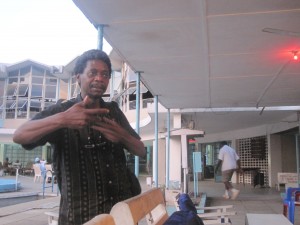Rethinking African Popular Culture and Performance: A Colloquium in Honour of Sola Olorunyomi at 50
In spotlighting the contributions of Sola Olorunyomi – author of the seminal Afrobeat!: Fela and the Imagined Continent and other influential texts – to literary and cultural studies, this colloquium intends to incite a debate around the ferment that Olorunyomi has generated as an idea, a scholar, a teacher within and outside the classroom, a performer, a social activist and a fifty-year-long insurrectionary event.
 Popular culture and performance in Africa, more intently, are isolated as the hub around which the colloquium’s sub-themes will revolve. We also want to look, beyond the normative cultural forms, at para-artistic sites such as television reality, telephony, virtual interaction (Facebook, Twitter, etc.), open-market hawking, etc. The colloquium’s immediate objective is to update critical engagements with popular modes of culture, taking into consideration the recent emergence of new forms such as hip-hop, on the one hand, and the transformation of other forms such as home video culture as exemplified by Nollywood, on the other.
Popular culture and performance in Africa, more intently, are isolated as the hub around which the colloquium’s sub-themes will revolve. We also want to look, beyond the normative cultural forms, at para-artistic sites such as television reality, telephony, virtual interaction (Facebook, Twitter, etc.), open-market hawking, etc. The colloquium’s immediate objective is to update critical engagements with popular modes of culture, taking into consideration the recent emergence of new forms such as hip-hop, on the one hand, and the transformation of other forms such as home video culture as exemplified by Nollywood, on the other.
Scholars are free to account for the itineraries of borrowed forms and explore the implications of such practices on indigenous cultural modes in relation to the global political economy of culture, as well as the double layers of local and Western cultural hegemony. In this regard, highlighting the role of virtual communication and cyberculture as rallying points of counterhegemonic sentiments in the mass revolutions recently witnessed on the continent will be pertinent, given Olorunyomi’s credentials as a site of transformative action.
While presentations are not restricted to any themes or art forms, we expect participants to adequately problematize existing debates on key issues of the theory of African popular arts, the question of aesthetics, ideology, reception, as well as the place/role of technology and the media in the ongoing reconfiguration of the field. In their investigations, intending participants are encouraged to explore any national, regional or virtual community model relevant to the colloquium’s focus.
We therefore seek panel and individual presentations from scholars and practitioners that address issues relating, but not limited, to the following:
– Performance (Music, Drama, Disc Jockeying, etc.)
– Virtual Communication/ Cyberculture
– Reality Television
– Telephony
– Advertising
– Stand-up Comedy
– Slogans
– Home Video
– Football Fandom
– Body Art
– Fashion
Abstracts of not more that 250 words should be sent as email attachments to lorunyomiat50@yahoo.com.
The colloquium will hold at the University of Ibadan in late November, 2011. A festschrift of presented papers will be published afterwards. Deadline: Friday, September 30, 2011 (12 midnight, Nigerian time). We will respond to applicants regarding acceptance not later than Monday, October 3, 2011.
Direct all enquiries to lorunyomiat50@yahoo.com. Alternatively, contact Senayon Olaoluwa (PhD Wits), Department of Languages and Linguistics, Osun State University or Tunji Azeez (PhD Ibadan), Department of Theatre Arts and Music, Lagos State University.
Announcer: Olorunyomi@50 Carnival of Friends
